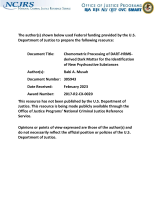Cluster analysis
Differential Decomposition Among Pig, Rabbit, and Human Remains
Temporal segmentation of facial behavior
An Analytical Workflow for Clustering Forensic Images (Student Abstract)
Chemometric Processing of DART-HRMS-derived Dark Matter for the Identification of New Psychoactive Substances
SChISM: Semantic Clustering via Image Sequence Merging for Images of Human-Decomposition
Collaborative learning of semi-supervised clustering and classification for labeling uncurated data
An analytical workflow for clustering forensic images
A Longitudinal Quasi-Experimental Study of Violence and Disorder Impacts of Urban CCTV Camera Clusters
Campus Sexual Assault Responses (CSAR): Informing Trauma-Informed Policies, Protocols, and Training
Sexual violence is a significant criminal justice problem with long-term effects for its victims. In particular, sexual assault on or related to college campuses across the United States presents a growing public health and economic burden, starting with significant impacts on academic outcomes.
See the YouTube Terms of Service and Google Privacy Policy




